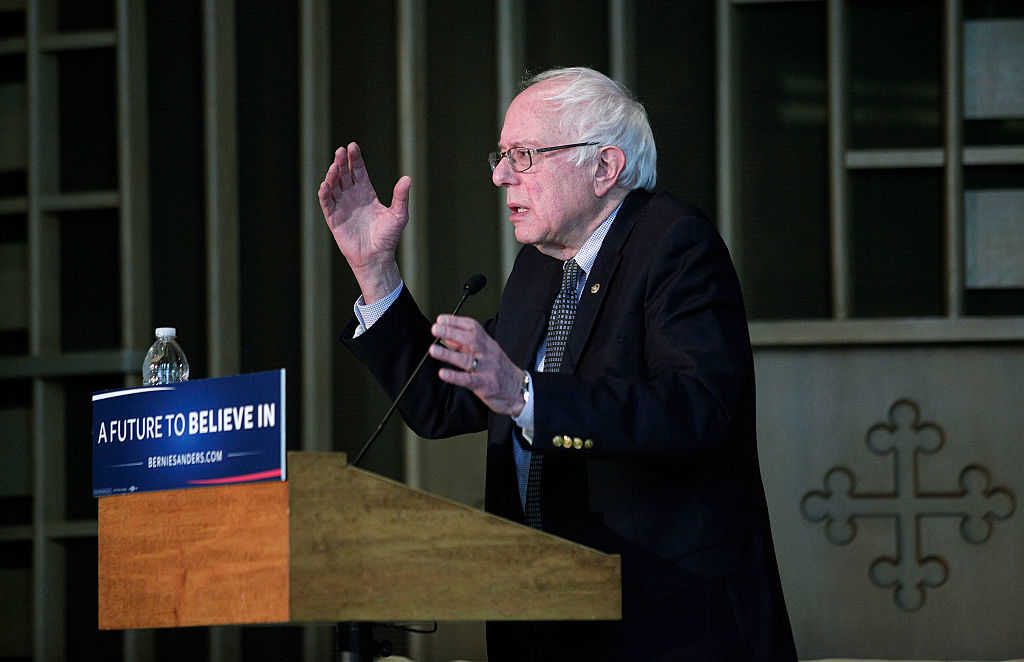Faithwire Opinion is a platform to discuss opinions and points of view from a variety of perspectives and voices. The opinions or information put forth by contributors/authors are exclusive to them and do not necessarily represent the views of Faithwire.
In a year of strange, bizarre and uncommon political happenings, Sen. Bernie Sanders’ troubling proclamations before a confirmation hearing on Wednesday truly topped the cake.
There’s perhaps no way to overstate just how completely alarming and disconcerting his antics were, as Sanders seemingly seized upon one of the most undisputed and basic tenants of biblical Christianity in an attempt to dispel a Trump nominee.
Sanders concluded that Russell Vought, President Donald Trump’s choice for deputy director of the White House Office of Management and Budget, was unfit for office based on Vought’s theological views, arguing that the nominee is “really not someone who this country is supposed to be about.”
Really? That’s a strange thing to say in light of Sanders’ typical message of embracing diversity, especially considering the fact that millions upon millions of Americans share Vought’s views about Christian salvation.
Plus, we’re a country founded on the principles of faith and freedom — a shining beacon in the world for those who wish to live and believe as they so choose, yet Sanders, who came dangerously close to securing the Democratic presidential nomination — if not the White House itself — maligned Vought simply because of his views on grace.
As Faithwire previously documented in detail, Sanders’ angst was rooted in a blog post that Vought wrote in January 2016 about the then-furious debate at evangelical school Wheaton College over whether Muslims and Christians worship the same God — a popular, heated and seemingly never-ending dispute in theological circles.
The post, which relied extensively on accurate biblical theology that any scripture-reading Christian with a basic understanding of Jesus’ character would embrace, apparently infuriated Sanders.
“You wrote, ‘Muslims do not simply have a deficient theology. They do not know God because they have rejected Jesus Christ, his son, and they stand condemned,’” Sanders said to Vought’s during a hearing. “Do you believe that that statement is Islamophobic?”
What followed was a back-and-forth in which Vought — who said it certainly wasn’t an Islamophobic statement — attempted to explain over and over again that he’s a Christian who believes in biblical principles (i.e. that belief in Jesus is essential to inherit salvation). That did little to appease Sanders, though.
The senator at one point started shouting at Vought, appearing to have virtually no understanding of the central tenets of Christianity and demanding to know if Vought believes that “people who are not Christians are going to be condemned?”
It was incredibly bizarre to watch, as the Bible — a book that has been around for quite some time — has been pretty clear on all of this since its inception. Still, Sanders forged on.
“You think your statement that you put into that publication, they do not know God because they rejected Jesus Christ, His Son, and they stand condemned, do you think that’s respectful of other religions?” Sanders asked, before proclaiming that he won’t vote for Vought. “I would simply say, Mr. Chairman, that this nominee is really not someone who this country is supposed to be about.”
It was at that point in the back-and-forth that I had a realization: The person whom Sanders is really at odds with is Jesus, not Vought. Christ makes it clear in the gospels that believing in him is the absolute and definitive key to salvation. In John 3:5, Jesus proclaims, “Very truly I tell you, no one can enter the kingdom of God unless they are born of water and the Spirit.”
And he makes it even clearer in verses 16-18: “For God so loved the world that he gave his one and only Son, that whoever believes in him shall not perish but have eternal life. For God did not send his Son into the world to condemn the world, but to save the world through him. Whoever believes in him is not condemned, but whoever does not believe stands condemned already because they have not believed in the name of God’s one and only Son.”
I don’t care if you’re an atheist, agnostic, Christian, Pastafarian, Muslim, Jew or some other faith derivative: from a First Amendment (free speech and religious expression) perspective, Sanders’ handling of this situation is alarming or, at the least, it runs amok of the protections enshrined in the First Amendment.
Not only is there nothing shocking about a Christian believing that one must accept Christ in order to inherit salvation, but most religions hold some sort of belief that they in and of themselves possess truth, with adherents many times pushing back against the theology embedded in alternative faith systems. Are all of those people precluded from holding federal positions?
It’s troubling that Sanders would essentially create a religious test to target the basic Christian doctrine embraced by a nominee in an effort to try and prevent that person from securing a position.
What’s to stop him from saying the same about another person who subscribes to some other religious group’s central tenants? That’s the key question everyone should be asking right now.
While initially shocking, none of this should be too surprising. After all, increasing numbers of Americans are falling prey to moral relativism and confusion, specifically when it comes to matters of faith and why people believe what they believe.
It’s a discussion I write about extensively in my new book, “Fault Line: How a Seismic Shift in Culture Is Threatening Free Speech and Shaping the Next Generation” — and it’s one I hope you dive further into.



